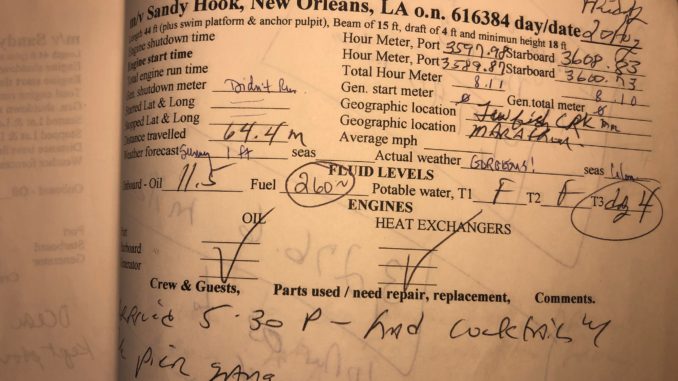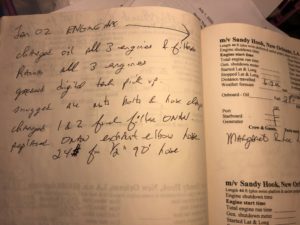
Log Books are legal documents.
Log Books are legal documents, at least they were when I was running commercial boats as a teenager servicing the Oil Field in South Louisiana. Waaaaaay back before GPS and Cellphones -remember 30 cents a minute? Still today, the commercial maritime industry requires crew to keep a Log Book. They don’t tell you much about what information must be kept but there are standards in the community. And there are also plenty of legal cases where the log book has proven a case, one way or the other.
But we are pleasure boaters and we don’t have to keep a log book. Yet, we believe that every pleasure boater should keep a log book. Maybe even two – one for trips and one for maintenance. Whether you keep your log in paper, computer or in the cloud, this information can be helpful even if we aren’t using our boat in commercial service.
The original written ship’s log was the legal log admissible in court. Bad penmanship, grease and splattered bug stains aside, this was the REAL DEAL. Anything that was later typed in a clean presentable format could have been altered to make the truth different than reality. That is why the courts wanted the original hand written log. Here’s a video of our log book entries and how we use it.
Maintenance Logs

Maintenance Logs for boat owners and sellers should be the real deal too. Hand written logs include dirty hand smudges and receipts for oil and filters, professional mechanic services and boatyard invoices. Yes, this translates to a lot of different size papers, receipts and invoices usually folded over and stowed in a zip lock baggie. This is real.
Of course you can enter all this into your computer and create a spread sheet that will add, subtract and multiply. You can create alarms to notify you when you need to change filters, oil, belts sometime in the distant future. You can even store your data in the cloud. This is pleasure boating and it’s all about what brings you pleasure. Frankly, I prefer the actual boating to double documenting but that’s me. Either way, we strongly recommend still keeping the receipts and invoices.
Any digital record can be altered to reflect better than reality. Some issues may be left out intentionally or accidentally. Who has the time to key into a data base all the gibberish seen in a service providers receipt? I realize some invoices are coded by the service company so you can then hand write the explanation on that paper (CODE xyz means check valves). After all, you asked them what that gibberish meant before you paid the invoice….didn’t you?
Be real. Look for the actual service receipts. They are the truth.
Be a Better Seller (or Buyer)
Log books or their computerized counterparts make you a better owner and therefore a better seller when the time comes. Reviewing the log book makes boat buying easier and more comforting. You know exactly what was done, when it was done and even where. Log books help you to maintain the boat. Bottom job, blister repairs, shaft removed and straightened, replace cutlass bearings in the primary strut (but somehow did not change the intermediate strut cutlass bearing) and other things that are on the invoice but may not make it to the digital version.
Wow. Sit back and let that sink in.
If the buyer wants to see your service log, use a digital camera or your phone to photograph those receipts in the zip lock bag and email or text them to him. They are the Real Deal. They are the truth.
Learn More About Cruising
Join us to learn more about Cruising 101 FUNdamentals in our next 2-day seminar. Our classes are small and sell out quickly. Register today! Buy and boat. Go cruising. Ask Captain Chris. 772-205-1859



